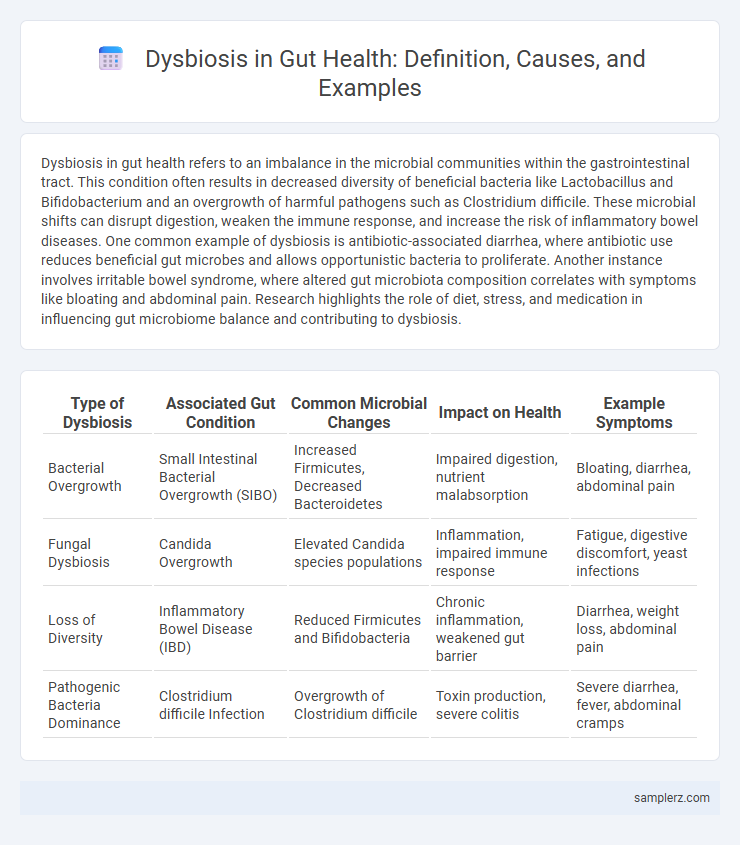Dysbiosis in gut health refers to an imbalance in the microbial communities within the gastrointestinal tract. This condition often results in decreased diversity of beneficial bacteria like Lactobacillus and Bifidobacterium and an overgrowth of harmful pathogens such as Clostridium difficile. These microbial shifts can disrupt digestion, weaken the immune response, and increase the risk of inflammatory bowel diseases. One common example of dysbiosis is antibiotic-associated diarrhea, where antibiotic use reduces beneficial gut microbes and allows opportunistic bacteria to proliferate. Another instance involves irritable bowel syndrome, where altered gut microbiota composition correlates with symptoms like bloating and abdominal pain. Research highlights the role of diet, stress, and medication in influencing gut microbiome balance and contributing to dysbiosis.
Table of Comparison
| Type of Dysbiosis | Associated Gut Condition | Common Microbial Changes | Impact on Health | Example Symptoms |
|---|---|---|---|---|
| Bacterial Overgrowth | Small Intestinal Bacterial Overgrowth (SIBO) | Increased Firmicutes, Decreased Bacteroidetes | Impaired digestion, nutrient malabsorption | Bloating, diarrhea, abdominal pain |
| Fungal Dysbiosis | Candida Overgrowth | Elevated Candida species populations | Inflammation, impaired immune response | Fatigue, digestive discomfort, yeast infections |
| Loss of Diversity | Inflammatory Bowel Disease (IBD) | Reduced Firmicutes and Bifidobacteria | Chronic inflammation, weakened gut barrier | Diarrhea, weight loss, abdominal pain |
| Pathogenic Bacteria Dominance | Clostridium difficile Infection | Overgrowth of Clostridium difficile | Toxin production, severe colitis | Severe diarrhea, fever, abdominal cramps |
Common Signs of Gut Dysbiosis
Common signs of gut dysbiosis include persistent bloating, abdominal discomfort, and irregular bowel movements such as diarrhea or constipation. Other indicators involve increased gas production, food intolerances, and fatigue. These symptoms often reflect an imbalance in gut microbiota, impacting digestive efficiency and overall immune function.
Bacterial Overgrowth as a Dysbiosis Example
Bacterial overgrowth in the gut, specifically Small Intestinal Bacterial Overgrowth (SIBO), exemplifies dysbiosis by disrupting the balance of beneficial and harmful bacteria. This condition leads to excessive fermentation, producing gas and toxins that cause bloating, diarrhea, and malabsorption of nutrients. Treatment often involves targeted antibiotics or probiotics to restore microbial homeostasis and improve gut health.
Fungal Imbalance and Candida Overgrowth
Fungal imbalance in gut health often manifests as Candida overgrowth, a common type of dysbiosis where the yeast Candida albicans proliferates excessively. This overgrowth disrupts the natural microbiome balance, leading to symptoms like digestive discomfort, bloating, and weakened immune response. Effective treatment typically involves antifungal therapies combined with dietary changes to restore gut microbial harmony.
Antibiotics-Induced Gut Dysbiosis
Antibiotics-induced gut dysbiosis occurs when broad-spectrum antibiotics disrupt the balance of the intestinal microbiota, reducing beneficial bacteria such as Bifidobacterium and Lactobacillus while promoting opportunistic pathogens like Clostridium difficile. This imbalance can lead to impaired digestion, weakened immune response, and increased inflammation in the gut mucosa. Long-term antibiotic use is strongly associated with decreased microbial diversity and increased risk of gastrointestinal disorders such as antibiotic-associated diarrhea and irritable bowel syndrome.
Diet-Related Dysbiosis Cases
Diet-related dysbiosis in gut health frequently arises from excessive consumption of processed foods high in refined sugars and unhealthy fats, which disrupts the balance of beneficial gut microbiota. Studies show that a diet low in fiber and rich in artificial additives promotes the overgrowth of pathogenic bacteria such as Clostridium difficile, leading to inflammation and impaired gut barrier function. Incorporating diverse, fiber-rich foods supports the restoration of microbial diversity and improves overall gastrointestinal health.
Inflammatory Bowel Diseases and Dysbiosis
Dysbiosis in gut health is strongly linked to Inflammatory Bowel Diseases (IBD) such as Crohn's disease and ulcerative colitis, characterized by an imbalance in the gut microbiota composition. Reduced diversity and overgrowth of pro-inflammatory bacteria like Escherichia coli exacerbate intestinal inflammation and mucosal damage. Targeting dysbiosis through probiotics, prebiotics, and fecal microbiota transplantation shows promise in modulating immune response and restoring microbial balance in IBD patients.
Clostridium difficile Infection as Dysbiosis
Clostridium difficile infection (CDI) represents a critical example of gut dysbiosis, characterized by an imbalance in the intestinal microbiota leading to severe diarrhea and colitis. Antibiotic use often disrupts normal gut flora, allowing C. difficile to proliferate and produce toxins that damage the intestinal lining. Effective management of CDI involves targeted antibiotic therapy and, in recurrent cases, fecal microbiota transplantation to restore healthy microbial balance.
Probiotic Deficiency Consequences
Probiotic deficiency in the gut disrupts the balance of beneficial microorganisms, leading to dysbiosis characterized by increased harmful bacteria. This imbalance can result in digestive issues such as bloating, diarrhea, and irritable bowel syndrome. Long-term consequences include weakened immune response and increased susceptibility to infections and inflammatory diseases.
Dysbiosis in Irritable Bowel Syndrome
Dysbiosis in Irritable Bowel Syndrome (IBS) involves an imbalance of gut microbiota, characterized by reduced diversity and an overgrowth of pathogenic bacteria such as Escherichia coli and Clostridium difficile. This microbial imbalance contributes to symptoms including abdominal pain, bloating, and altered bowel habits by disrupting gut barrier function and promoting low-grade inflammation. Targeted probiotics and dietary interventions aim to restore microbial equilibrium, improving symptom management in IBS patients.
Long-term Effects of Untreated Gut Dysbiosis
Untreated gut dysbiosis can lead to chronic inflammation, increasing the risk of metabolic disorders such as type 2 diabetes and obesity. Persistent imbalance in gut microbiota contributes to impaired immune response and may exacerbate autoimmune diseases like Crohn's disease and rheumatoid arthritis. Long-term dysbiosis is also linked to mental health issues, including anxiety and depression, through the gut-brain axis.

example of dysbiosis in gut health Infographic
 samplerz.com
samplerz.com